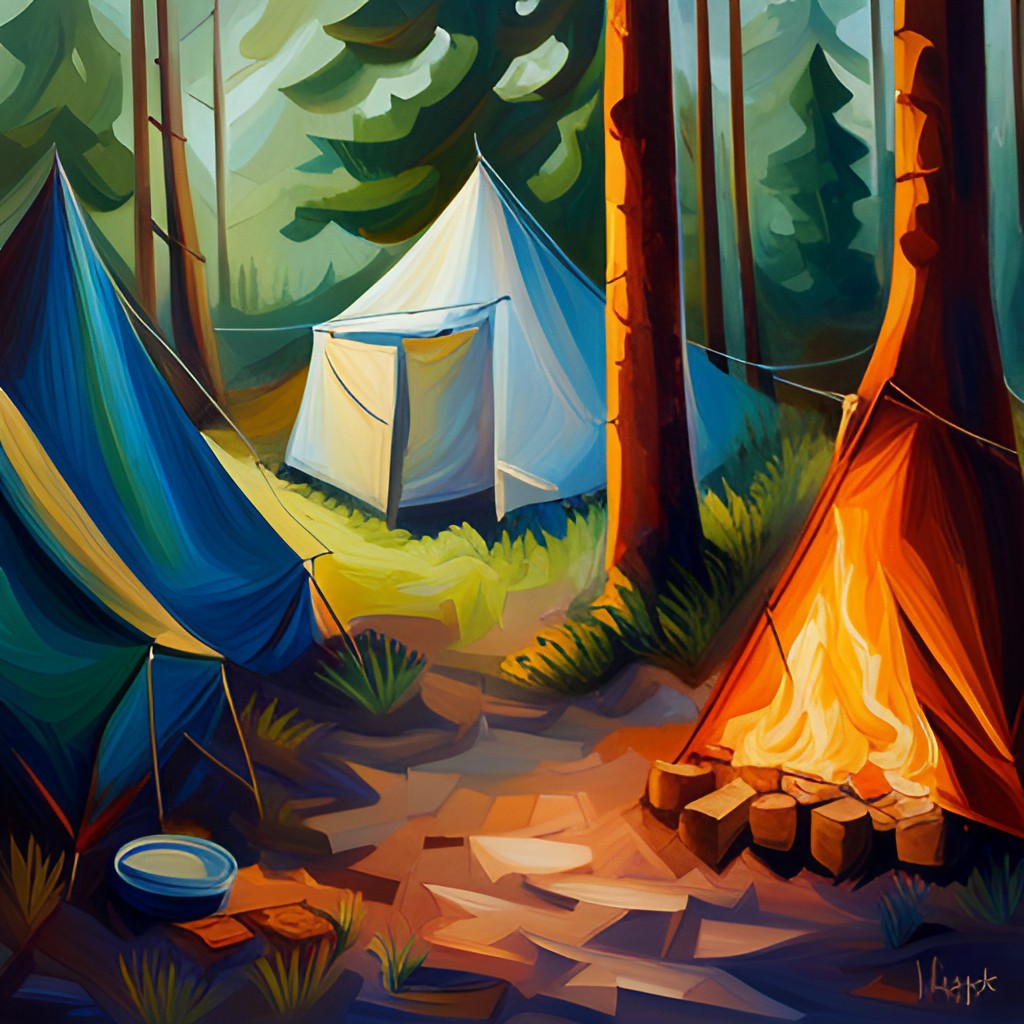
Cooking and enjoying delicious meals while camping can elevate your outdoor experience to a whole new level. Whether a seasoned camper or new to outdoor cooking, having the right cooking tips and gear essentials can make all the difference. Imagine savoring a gourmet meal under the stars, surrounded by the beauty of nature, with the aromas of perfectly grilled meats and flavorful vegetables wafting through the air.
In this article, we will delve into the world of cooking while tent camping, exploring essential gear, practical tips, and mouthwatering recipes that will allow you to create gourmet meals that will impress even the most discerning palates. From campfire cooking techniques to meal planning and kitchen organization, we’ve got you covered for a culinary adventure in the great outdoors.
- The Importance of Gourmet Cooking While Camping – The Ultimate Guide to Cooking While Tent Camping
- 1. Enhanced Enjoyment – The Importance of Gourmet Cooking While Camping
- 2. Health and Nutrition – The Importance of Gourmet Cooking While Camping
- 3. Creativity and Experimentation – The Importance of Gourmet Cooking While Camping
- 4. Connection With Nature – The Importance of Gourmet Cooking While Camping
- 5. Social Bonding – The Importance of Gourmet Cooking While Camping
- Essential Camping Cooking Gear for Gourmet Meals – The Ultimate Guide to Cooking While Tent Camping
- A. Camping Stove Options for Gourmet Cooking – Essential Camping Cooking Gear for Gourmet Meals
- B. Cookware Essentials for Preparing Gourmet Meals – Essential Camping Cooking Gear for Gourmet Meals
- C. Utensils and Other Kitchen Tools Needed for Gourmet Cooking – Essential Camping Cooking Gear for Gourmet Meals
- Essential Tips for Your Camping Adventure – The Ultimate Guide to Cooking While Tent Camping
- 1. Research and Gather Recipes – Essential Tips for Your Camping Adventure
- 2. Consider the Equipment – Essential Tips for Your Camping Adventure
- 3. Plan for Fresh Ingredients – Essential Tips for Your Camping Adventure
- 4. Focus on Flavors and Seasonings – Essential Tips for Your Camping Adventure
- 5. Pack Specialty Ingredients – Essential Tips for Your Camping Adventure
- 6. Balance the Meals – Essential Tips for Your Camping Adventure
- 7. Embrace Make-Ahead Options – Essential Tips for Your Camping Adventure
- 8. Don’t Forget About Presentation – Essential Tips for Your Camping Adventure
- 9. Enjoy the Process – Essential Tips for Your Camping Adventure
- Campfire Cooking Techniques for Gourmet Meals – The Ultimate Guide to Cooking While Tent Camping
- Tips for Enhancing Flavors and Adding Depth to Gourmet Dishes – The Ultimate Guide to Cooking While Tent Camping
- Tips for Food Storage and Preservation at the Tent Campsite – The Ultimate Guide to Cooking While Tent Camping
- Essential Safety Practices and Hygiene Tips When Cooking – The Ultimate Guide to Cooking While Tent Camping
- 1. Choose a Safe Cooking Location – Essential Safety Practices and Hygiene Tips When Cooking
- 2. Practice Good Hand Hygiene – Essential Safety Practices and Hygiene Tips When Cooking
- 3. Maintain Clean Cooking Equipment – Essential Safety Practices and Hygiene Tips When Cooking
- 4. Cook Food to the Correct Temperature – Essential Safety Practices and Hygiene Tips When Cooking
- 5. Avoid Cross-Contamination – Essential Safety Practices and Hygiene Tips When Cooking
- 6. Properly Store and Handle Leftovers – Essential Safety Practices and Hygiene Tips When Cooking
- 7. Be Cautious With Fire and Heat – Essential Safety Practices and Hygiene Tips When Cooking
- 8. Dispose of Waste Properly – Essential Safety Practices and Hygiene Tips When Cooking
- Tips on Cleaning and Maintaining Your Cooking Gear at the Campsite – The Ultimate Guide to Cooking While Tent Camping
- 1. Clean After Each Use – Tips on Cleaning and Maintaining Your Cooking Gear at the Campsite
- 2. Use a Brush or Sponge – Tips on Cleaning and Maintaining Your Cooking Gear at the Campsite
- 3. Dry Thoroughly – Tips on Cleaning and Maintaining Your Cooking Gear at the Campsite
- 4. Store Properly – Tips on Cleaning and Maintaining Your Cooking Gear at the Campsite
- 5. Check for Damage – Tips on Cleaning and Maintaining Your Cooking Gear at the Campsite
- 6. Maintain Your Stove – Tips on Cleaning and Maintaining Your Cooking Gear at the Campsite
- 7. Practice Leave-No-Trace Principles – Tips on Cleaning and Maintaining Your Cooking Gear at the Campsite
- Conclusion – The Ultimate Guide to Cooking While Tent Camping
- Frequently Asked Questions – The Ultimate Guide to Cooking While Tent Camping
The Importance of Gourmet Cooking While Camping – The Ultimate Guide to Cooking While Tent Camping
Cooking gourmet meals at a tent campsite goes beyond just satisfying your hunger. It adds a whole new dimension to your camping experience, elevating it from a simple outdoor excursion to a culinary adventure. Here are a few reasons why gourmet cooking is essential at a tent campsite:
1. Enhanced Enjoyment – The Importance of Gourmet Cooking While Camping
Gourmet meals are a feast for the senses. Combining fresh ingredients, flavorful seasonings, and creative recipes can turn a basic meal into a memorable dining experience. It adds an element of indulgence and pleasure to your camping trip, making it more enjoyable and satisfying.
2. Health and Nutrition – The Importance of Gourmet Cooking While Camping
When camping, it’s vital to nourish your body with nutritious meals. Gourmet cooking allows you to incorporate various wholesome ingredients, including fresh fruits, vegetables, lean proteins, and whole grains. You control your food’s quality and nutritional content by cooking your gourmet meals.
3. Creativity and Experimentation – The Importance of Gourmet Cooking While Camping
Gourmet cooking at a tent campsite allows you to unleash your culinary creativity. It allows you to experiment with new flavors, techniques, and recipes, expanding your cooking skills and knowledge. Trying out unique combinations of ingredients and exploring different cooking methods can be exciting and rewarding.
4. Connection With Nature – The Importance of Gourmet Cooking While Camping
Cooking gourmet meals at a tent campsite allows you to connect with nature more profoundly. Gathering fresh ingredients, using local produce, and incorporating elements from the natural surroundings into your meals can create a sense of harmony and appreciation for the environment. It’s a chance to embrace the beauty of the outdoors while enjoying delicious food.
5. Social Bonding – The Importance of Gourmet Cooking While Camping
Sharing a gourmet meal with family or friends at a tent campsite can strengthen bonds and create lasting memories. It provides an opportunity for everyone to come together, share stories, and enjoy the experience of dining under the open sky. Gourmet cooking can foster a sense of camaraderie and connection among fellow campers.
Essential Camping Cooking Gear for Gourmet Meals – The Ultimate Guide to Cooking While Tent Camping
A. Camping Stove Options for Gourmet Cooking – Essential Camping Cooking Gear for Gourmet Meals
When it comes to gourmet cooking at your campsite, having a reliable camping stove is essential. There are various options available that are well-suited for gourmet cuisine. One popular choice is a propane stove, known for its ease of use and efficiency. These stoves offer adjustable heat levels and are compatible with standard propane canisters.
Another option is a multi-fuel stove, which provides versatility by running on different fuel types such as propane, gasoline, kerosene, or even diesel. For those looking for a lightweight and portable option, backpacking stoves are ideal. They are compact and designed to be carried easily in a backpack. If you prefer cooking over an open fire, a campfire grill or grate can provide a stable surface for gourmet cooking.
Additionally, wood-burning stoves offer a traditional and eco-friendly option, utilizing small pieces of wood as fuel. Portable ovens explicitly designed for camping are available for those who want to take their gourmet cooking to the next level. These compact ovens can bake, roast, and grill your favorite dishes.
When choosing a camping stove, consider size, weight, fuel availability, ease of use, and cooking power. With the right camping stove, you can enjoy the convenience and versatility of preparing gourmet meals even outdoors.
B. Cookware Essentials for Preparing Gourmet Meals – Essential Camping Cooking Gear for Gourmet Meals
Having the appropriate cookware is essential when it comes to preparing gourmet meals at your tent campsite. Here are some indispensable cookware items that will help you elevate your cooking experience. First, a campfire grill or grate provides a stable surface for cooking directly over an open fire, allowing you to grill meats and vegetables and make campfire pizzas. Second, a Dutch oven is a versatile cookware perfect for baking, roasting, stewing, and frying gourmet dishes like braised meats or hearty stews.
Third, a cast iron skillet is a must-have for any campsite cooking, offering even heat distribution and a natural non-stick surface for searing meats and sautéing vegetables. Fourth, a pot with a lid is essential for boiling water, cooking pasta, and simmering soups and sauces. Look for a durable and lightweight option with a secure cover. Fifth, a griddle or flat top provides a large, flat cooking surface for making pancakes, eggs, and grilled sandwiches.
Finally, remember to use heat-resistant gloves to handle hot items safely. Investing in quality cookware made of durable materials will ensure an enjoyable and efficient gourmet cooking experience at your tent campsite.
C. Utensils and Other Kitchen Tools Needed for Gourmet Cooking – Essential Camping Cooking Gear for Gourmet Meals
To achieve gourmet cooking at your tent campsite, having the proper utensils and kitchen tools is essential. Here are some items you should consider packing for your outdoor culinary adventures.
First, durable stainless steel or bamboo utensils, including a spatula, serving spoon, tongs, and a whisk, will be helpful for various cooking tasks. Second, a sharp chef’s knife and a cutting board are indispensable for prepping ingredients with precision. Third, a can opener and a bottle opener will ensure you can easily access canned goods and beverages.
Fourth, a set of measuring cups and spoons allows for accurate measurements when following recipes. Fifth, a portable camping coffee maker or a French press will help you kick-start your mornings with a delicious cup of coffee. Pack a compact camping stove, fuel canisters, and a lighter or matches for cooking.
Consider bringing a collapsible sink or basin for washing dishes and a sponge or scrub brush for cleaning. Lastly, pay attention to food storage containers or resealable bags to keep ingredients fresh and organized. These utensils and kitchen tools will enhance your gourmet cooking experience and make meal preparation more enjoyable at your tent campsite.
Essential Tips for Your Camping Adventure – The Ultimate Guide to Cooking While Tent Camping
Gourmet meal planning for a camping trip adds culinary enjoyment to your outdoor adventure. Here are some tips to help you plan gourmet meals for your camping trip:
1. Research and Gather Recipes – Essential Tips for Your Camping Adventure
Look for gourmet recipes online or in camping cookbooks designed explicitly for outdoor cooking. Choose recipes that use fresh ingredients and incorporate exciting flavors and techniques.
2. Consider the Equipment – Essential Tips for Your Camping Adventure
Take into account the cooking equipment you’ll have available at the campsite. If you have access to a campfire, plan meals that can be cooked over an open flame. If you’re using a camping stove, choose recipes that can be easily prepared on it. Also, consider any specialty cooking tools or accessories you may need for specific gourmet recipes.
3. Plan for Fresh Ingredients – Essential Tips for Your Camping Adventure
While camping, it’s essential to consider the perishability of ingredients. Opt for recipes that use ingredients that can be easily stored and remain fresh for your trip. Consider pre-cutting vegetables or portioning ingredients in advance to save time at the campsite.
4. Focus on Flavors and Seasonings – Essential Tips for Your Camping Adventure
Gourmet meals often rely on flavorful combinations and seasonings. Pack a selection of spices, herbs, and condiments that can enhance the taste of your dishes. Consider bringing small containers or resealable bags for easy storage and transport.
5. Pack Specialty Ingredients – Essential Tips for Your Camping Adventure
If you have specific gourmet ingredients in mind, such as truffle oil, specialty cheeses, or unique spices, make sure to pack them securely to keep them fresh and prevent any spills or damage.
6. Balance the Meals – Essential Tips for Your Camping Adventure
Plan various gourmet meals, including breakfast, lunch, dinner, and snacks. Aim for a balance of proteins, carbohydrates, and fresh fruits and vegetables to keep your meals nutritious and satisfying.
7. Embrace Make-Ahead Options – Essential Tips for Your Camping Adventure
Prepare some components of your meals in advance to save time and make cooking at the campsite more convenient. Marinades, dressings, and pre-cut vegetables can be prepared ahead of time and stored in sealed containers or resealable bags.
8. Don’t Forget About Presentation – Essential Tips for Your Camping Adventure
Gourmet meals are not just about taste but also about visual appeal. Consider how you can present your dishes as attractive and delicious, even in a camping setting. Bring lightweight, reusable food containers or serving dishes to elevate the dining experience.
9. Enjoy the Process – Essential Tips for Your Camping Adventure
Gourmet meal planning and cooking should be enjoyable, so take the time to savor preparing and sharing delicious meals in the great outdoors. Involve your fellow campers in the cooking process, and embrace the unique ambiance and flavors camping provides.
Campfire Cooking Techniques for Gourmet Meals – The Ultimate Guide to Cooking While Tent Camping
A. Grilling and BBQ Techniques for Flavorful Meats and Vegetables – Camping Cooking Techniques for Gourmet Meals
Grilling and BBQ techniques can elevate your camping meals to gourmet levels by adding delicious smoky flavors to your meats and vegetables. To ensure successful grilling and BBQing at your campsite, there are a few tips to keep in mind. First, preheat the grill and oil the grates to prevent sticking.
Next, consider using direct heat for quick-cooking items like steaks and burgers, placing them directly over the flame or hot coals. For larger cuts of meat or foods that require longer cooking times, opt for indirect heat by setting them to the side of the flame or on a cooler part of the grill. This allows for slower and more even cooking. Enhance the flavors of your meats by marinating them beforehand or using dry rubs with a combination of herbs, spices, and salt.
Searing the meat over high heat at the beginning creates a flavorful crust, and basting or glazing in the final minutes adds moisture and a delicious coating. Remember to grill vegetables, which can be done by brushing them with oil, seasoning them, and examining them until tender and slightly charred.
Remember to let your grilled meats rest before serving, and for an extra smoky flavor, consider adding soaked wood chips or chunks to the grill. With these techniques, you can create mouthwatering gourmet meals that impress your fellow campers.
B. One-Pot Cooking Methods for Convenient Gourmet Meals – Camping Cooking Techniques for Gourmet Meals
One-pot cooking methods are convenient and efficient for preparing gourmet meals at your campsite. These techniques minimize the need for multiple pots and pans, making clean-up easier while allowing you to create flavorful and satisfying dishes.
One popular one-pot cooking method is foil packet cooking, where you wrap your ingredients in aluminum foil and cook them directly over the campfire or on a grill. This versatile method allows endless possibilities, from marinated meats and vegetables to seafood and desserts.
Another option is Dutch oven cooking, which uses a heavy cast iron pot with a tight-fitting lid. Dutch ovens distribute heat evenly, making them ideal for slow-cooked stews, soups, roasts, and baked goods. Simply place your ingredients in the Dutch oven, add some liquid or sauce, and let the heat do its magic. Stir-fries and skillet meals are also excellent one-pot options.
Using a portable camping stove or a grill with a side burner, you can cook delicious stir-fried dishes or sautéed meals using a single skillet or wok. These convenient methods allow flavors to meld together, making mouthwatering gourmet meals with minimal effort.
Tips for Enhancing Flavors and Adding Depth to Gourmet Dishes – The Ultimate Guide to Cooking While Tent Camping
Enhancing flavors and adding depth to dishes while cooking can take your meals to the next level. One way to achieve this is by starting your container with sautéed aromatic ingredients like onions, garlic, and shallots, which create a flavorful base. Experiment with a variety of herbs and spices to enhance the flavors further. Fresh herbs like basil, cilantro, or rosemary can add freshness, while spices like cumin, paprika, or curry powder can add depth and complexity.
Building layers of flavor is another key technique. Brown the meat first, sauté the vegetables and deglaze the pan with wine or broth to develop rich flavors. Homemade stocks or broths can add richness and depth to soups, stews, and sauces. Experiment with marinades and sauces using soy sauce, citrus juice, vinegar, herbs, and spices. Grilling or smoking your ingredients can also impart a smoky flavor that adds complexity to the dish.
Additionally, remember the importance of acidity in balancing flavors. Adding a splash of lemon juice or vinegar can brighten the flavors. Lastly, taste and adjust your dishes as you cook to ensure they are well-balanced and seasoned to perfection.
Tips for Food Storage and Preservation at the Tent Campsite – The Ultimate Guide to Cooking While Tent Camping
When it comes to food storage and preservation for gourmet meals at the tent campsite, there are a few key tips to keep in mind. First and foremost, invest in quality coolers and ice packs to keep perishable ingredients and leftovers fresh. Pack the cooler with plenty of ice or ice packs in a shaded, cool campsite area.
To prevent leaks or cross-contamination, organize your food items properly using resealable bags or airtight containers. Labeling the containers can help you quickly identify the ingredients and avoid confusion. Consider prepping some ingredients ahead of time, such as chopping vegetables or marinating meats, and storing them in separate containers to save time and ensure freshness.
When storing dry ingredients, bring airtight containers or resealable bags to keep them safe from moisture and pests. This is especially important for ingredients like spices, herbs, and grains. If you plan on bringing perishable ingredients that must be kept cold, such as dairy products or raw meats, consider freezing them in advance. They can act as additional ice packs in your cooler, chilling other items while gradually thawing.
Lastly, be mindful of food safety practices. Keep raw and cooked foods separate to avoid cross-contamination, and ensure that meats are cooked thoroughly before consumption. Follow proper food handling and storage guidelines to prevent any risk of foodborne illnesses.
Essential Safety Practices and Hygiene Tips When Cooking – The Ultimate Guide to Cooking While Tent Camping
When cooking at a tent campsite, it’s essential to prioritize safety practices and maintain proper hygiene to ensure a healthy and enjoyable dining experience. Here are some critical tips to keep in mind:
1. Choose a Safe Cooking Location – Essential Safety Practices and Hygiene Tips When Cooking
Look for a designated cooking area, such as a fire ring or a camp stove setup, where you can safely prepare your meals. Ensure the cooking location is on a stable surface, away from flammable materials like dry grass or overhanging branches.
Keep a safe distance from tents and other structures to prevent any potential fire hazards. Additionally, following any campground or park regulations regarding cooking and fires is vital to ensure you comply with local guidelines.
2. Practice Good Hand Hygiene – Essential Safety Practices and Hygiene Tips When Cooking
Good hand hygiene is crucial when cooking at a tent campsite to prevent the spread of germs and maintain food safety. Before handling food or cooking utensils, wash your hands thoroughly with soap and clean water for at least 20 seconds. If clean water is not readily available, use a hand sanitizer that contains at least 60% alcohol.
To avoid cross-contamination, wash your hands after handling raw meat, poultry, or fish. It’s also essential to keep a handwashing station near your cooking area, equipped with water, soap, and paper towels for regular handwashing throughout the cooking process.
3. Maintain Clean Cooking Equipment – Essential Safety Practices and Hygiene Tips When Cooking
After each use, thoroughly clean your cooking utensils, pots, pans, and grills with hot, soapy water. Use a scrub brush or sponge to remove any food residues or grease. Rinse the equipment well to remove any soap residue.
If possible, sanitize the cooking equipment by boiling them in water for a few minutes or using disinfectant wipes. It’s also important to regularly inspect your cooking equipment for any signs of damage or wear and tear. Replace any worn-out or damaged equipment to ensure safe and effective cooking.
4. Cook Food to the Correct Temperature – Essential Safety Practices and Hygiene Tips When Cooking
Invest in a reliable food thermometer to accurately measure the internal temperature of meats, poultry, fish, and other foods. Follow recommended cooking temperatures and guidelines for different types of food. For example, poultry should be cooked to an internal temperature of 165°F (74°C), while steaks and roasts can be cooked to various levels of doneness depending on personal preference.
Avoid relying solely on visual cues such as color or texture to determine if food is cooked thoroughly. Use the food thermometer to check the temperature at the thickest part of the food. This practice ensures that harmful bacteria are eliminated and your meals are cooked to perfection. Remember to clean and sanitize the thermometer after each use to prevent cross-contamination.
5. Avoid Cross-Contamination – Essential Safety Practices and Hygiene Tips When Cooking
Cross-contamination occurs when bacteria from raw food contaminate cooked or ready-to-eat food, leading to potential foodborne illnesses. Keeping raw meats, poultry, seafood, and juices separate from other foods is essential to prevent cross-contamination.
Use separate cutting boards, utensils, and plates for raw and cooked food. Wash your hands thoroughly with soap and water before and after handling raw food. Clean and sanitize surfaces, utensils, and equipment to eliminate any traces of bacteria.
6. Properly Store and Handle Leftovers – Essential Safety Practices and Hygiene Tips When Cooking
When it comes to camping, it’s essential to follow specific guidelines. First, quickly cool leftovers in shallow, airtight containers and a cooler with ice packs or a refrigerator. Avoid leaving leftovers at room temperature for an extended period.
Label and date your leftovers to keep track of their freshness. When reheating, heat them thoroughly to an internal temperature of 165°F (74°C) to kill any potential bacteria. Discard any leftovers left unrefrigerated for more than two hours or one hour in hot weather conditions.
7. Be Cautious With Fire and Heat – Essential Safety Practices and Hygiene Tips When Cooking
Follow these safety tips to prevent accidents and ensure a safe cooking experience. First, always use designated fire pits or camping stoves for cooking and keep a safe distance from tents, trees, and other flammable objects. Monitor the flames and never leave them unattended.
Avoid cooking during strong winds that can potentially spread the fire. Use long-handled utensils to keep a safe distance from the heat source. Additionally, be mindful of hot surfaces and use oven mitts or heat-resistant gloves when handling hot cookware. Keep a fire extinguisher or a bucket of water nearby for emergencies.
8. Dispose of Waste Properly – Essential Safety Practices and Hygiene Tips When Cooking
Separate your waste into categories: recyclables, non-recyclables, and organic waste. Use designated recycling bins and trash containers if available. If no facilities are on-site, pack your rubbish in sealable bags or containers and bring them back to dispose of properly. Avoid littering or burying trash at the campsite, as it can harm wildlife and ecosystems.
Dispose of organic waste in designated compost areas or bury it at least 200 feet away from water sources and campsites. Remember to follow any specific waste management rules or regulations the campground or park authorities set.
Tips on Cleaning and Maintaining Your Cooking Gear at the Campsite – The Ultimate Guide to Cooking While Tent Camping
Keeping your cooking gear clean and well-maintained is essential for a safe and enjoyable camping experience. Here are some tips on cleaning and maintaining your cooking gear at the campsite:
1. Clean After Each Use – Tips on Cleaning and Maintaining Your Cooking Gear at the Campsite
After cooking, thoroughly clean your pots, pans, utensils, and other cookware. Use hot water and biodegradable soap to wash off food particles and grease. Scrub them with a brush or sponge to remove stubborn stains. Rinse everything well to ensure no soap residue remains.
2. Use a Brush or Sponge – Tips on Cleaning and Maintaining Your Cooking Gear at the Campsite
After cooking, scrub the pots, pans, and utensils with a brush or sponge to remove any food residues and grease. Make sure to reach all the corners and crevices to ensure thorough cleaning. Use gentle but firm strokes to loosen any stuck-on debris. Rinse the items with hot water to remove any remaining residue. Using a brush or sponge will help you effectively clean your cooking gear and ensure it is ready for your next camping adventure.
3. Dry Thoroughly – Tips on Cleaning and Maintaining Your Cooking Gear at the Campsite
Before storing them, use a clean towel or cloth to dry all the utensils, pots, pans, and other equipment. Moisture left on the surfaces can promote the growth of bacteria or cause rusting, affecting the quality and safety of your cooking gear. Pay special attention to drying the nooks and crannies of your equipment to ensure all areas are moisture-free. Let the items air dry in a well-ventilated area to ensure complete drying.
4. Store Properly – Tips on Cleaning and Maintaining Your Cooking Gear at the Campsite
After cleaning and drying your equipment, store them properly to prevent damage and maintain their functionality. Use designated storage containers or bags to keep your utensils, pots, pans, and other cooking gear organized and protected. Ensure the containers are clean, dry, and free from moisture or food residue. If you have any sharp knives or tools, consider using blade guards or sheaths to prevent accidents and maintain their sharpness. Store your cooking gear in a cool, dry place away from direct sunlight or extreme temperatures. This will help to prevent rust, corrosion, and other damage that can occur over time.
5. Check for Damage – Tips on Cleaning and Maintaining Your Cooking Gear at the Campsite
Inspect your utensils, pots, pans, stoves, and other equipment to ensure they are in good working condition. Look for cracks, dents, or loose parts that may affect their functionality or safety. Pay close attention to handles, knobs, and hinges, as these are common areas where damage can occur.
If you find any issues, such as a cracked handle or a malfunctioning burner, only use the equipment once it has been repaired or replaced. Regularly checking for damage not only helps prevent accidents but also allows you to address any issues before they worsen. Inspecting your cooking gear before each use ensures you can enjoy your meals safely and comfortably during your camping trip.
6. Maintain Your Stove – Tips on Cleaning and Maintaining Your Cooking Gear at the Campsite
After each use, clean the stove thoroughly to remove any food debris or residue. Use mild detergent and water to clean the stove’s surfaces, burners, and knobs. Pay attention to any clogged or blocked burner holes, and use a small wire or a needle to unclog them if necessary. Inspect the fuel lines and connections for any signs of damage or leaks.
If you notice any issues, such as cracked hoses or loose fittings, do not use the stove and have it repaired or replaced. Also, lubricate movable parts, such as hinges or knobs, to ensure smooth operation. Store the stove in a clean and dry place when not in use, protecting it from moisture and harsh weather conditions.
7. Practice Leave-No-Trace Principles – Tips on Cleaning and Maintaining Your Cooking Gear at the Campsite
When camping, it is crucial to follow Leave-No-Trace principles to minimize your impact on the environment and preserve the area’s natural beauty. This includes being mindful of how you handle and dispose of waste. Pack out all trash and dispose of it properly in designated receptacles or by taking it home. Avoid leaving food scraps or packaging behind, as they can attract wildlife and disrupt the ecosystem.
Use biodegradable soap for dishwashing and dispose of wastewater at least 200 feet away from water sources. Respect wildlife and their habitats by observing from a distance and not feeding or approaching them. Leave natural and cultural artifacts undisturbed, and avoid damaging vegetation by staying on designated trails.
Conclusion – The Ultimate Guide to Cooking While Tent Camping

In conclusion, you can elevate your camping meals to a gourmet experience with the right cooking tips and gear essentials. You can enjoy delicious and flavorful dishes outdoors by carefully planning your meals, investing in quality camping cooking equipment, and utilizing various cooking techniques.
From grilling and one-pot cooking to skewering and creative techniques, endless possibilities exist. Remember to prioritize food safety and hygiene, choose a safe cooking location, and practice proper waste management. With these cooking tips and gear essentials, you can embark on a culinary adventure during your tent camping trip, creating memorable meals and savoring the joys of gourmet cooking in the wilderness.
In addition to the practical aspects of cooking, it’s essential to embrace the beauty and simplicity of nature while preparing your meals. Take the time to appreciate the surroundings, savor the flavors of local ingredients, and share the experience with your fellow campers. Cooking at a tent campsite allows you to connect with nature and tap into your creativity as you whip up gourmet meals under the open sky.
So, pack your cooking gear, gather your ingredients, and embark on a culinary journey that combines the pleasures of camping with the joys of gourmet dining. With these cooking tips and gear essentials, you’re well-equipped to create unforgettable meals that will make your tent camping experience truly extraordinary.
Recommended Reading – Conclusion
Internal:
10 Delicious And Easy Vegan Camping Meals To Satisfy Your Outdoor Appetite (tentcampingtrips.com)
20 Delicious And Nutritious Foods For Your Next Tent Camping Adventure (tentcampingtrips.com)
External:
Cook While Camping: The Best Tips for Cooking Food on a Camping Trip | Curated.com
Camping Cuisine 101: Essential Gear, Pro Tips (+16 Mouthwatering Recipes) (positiveadventures.com)
Frequently Asked Questions – The Ultimate Guide to Cooking While Tent Camping
1. What Cooking Method is Best for Camping? – FAQs
When it comes to camping, the best cooking method is often subjective and depends on personal preferences and the resources available. However, one of the most versatile and popular cooking methods for camping is a camp stove. Camp stoves offer the convenience of adjustable heat, making them suitable for various cooking techniques such as simmering, boiling, and frying.
They are compact, portable, and easy to use, allowing you to prepare meals efficiently. Additionally, camp stoves are typically fueled by propane or butane, providing a consistent and reliable heat source for cooking. Whether cooking breakfast, lunch, or dinner, a camp stove can be a reliable companion for preparing delicious meals while enjoying the great outdoors.
2. Why Cooking Utensils is Necessary in Camping? – FAQs
Cooking utensils are essential in camping for several reasons. First, they allow for efficient and safe food preparation. You can quickly chop, slice, and dice ingredients with the proper utensils, mix and stir food, and handle hot pots and pans. Second, cooking utensils enable you to cook various meals and recipes while camping. From simple dishes to more elaborate gourmet meals, having the proper utensils can significantly affect the quality and complexity of the food you can prepare.
Additionally, utensils are essential for proper food hygiene and safety by ensuring you have dedicated tools for handling raw and cooked food separately. Finally, cooking utensils make the camping experience more enjoyable and convenient. They allow you to replicate your cooking experience at home, making it easier to create delicious meals and enjoy a comfortable camping trip.
3. How Do You Cook in a Tent Safely? – FAQs
Cooking in a tent requires specific safety precautions to ensure a safe and enjoyable camping experience. First, choose a well-ventilated area away from flammable materials, such as trees or dry grass, to set up your cooking equipment. Use a stable and sturdy surface, such as a camping stove or a fire ring, to prevent accidents. Keep a fire extinguisher or a bucket of water nearby in emergencies.
When using open flames, such as a campfire or a portable grill, never leave them unattended and always fully extinguish them before leaving the campsite or going to sleep. Additionally, practice good food hygiene by properly storing and handling raw and cooked food separately and ensuring that meats are cooked to the correct temperature. By following these safety measures, you can cook in a tent with peace of mind and minimize the risk of accidents or injuries.














